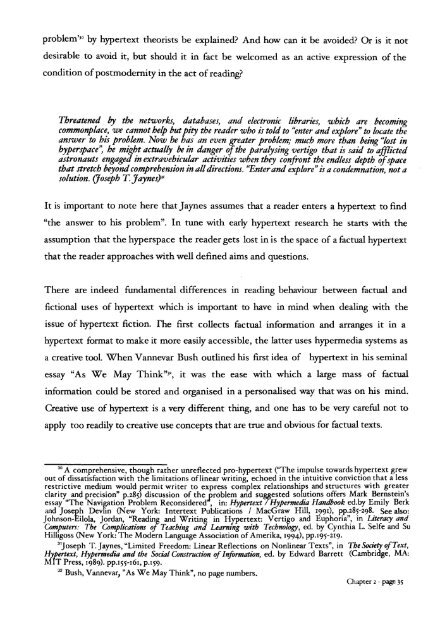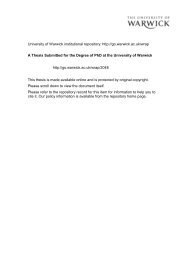From Page to Screen - WRAP: Warwick Research Archive Portal ...
From Page to Screen - WRAP: Warwick Research Archive Portal ...
From Page to Screen - WRAP: Warwick Research Archive Portal ...
You also want an ePaper? Increase the reach of your titles
YUMPU automatically turns print PDFs into web optimized ePapers that Google loves.
problem'> by hypertext theorists be explained? And how can it be avoided? Or is it not<br />
desirable <strong>to</strong> avoid it, but should it in fact be welcomed as an active expression of the<br />
condition ofpostmodernity in the act ofreading?<br />
Threatened by the networks, databases, and electronic libraries, which are becoming<br />
commonplace, we cannot help butpity the reader who is <strong>to</strong>ld <strong>to</strong> "enter and explore" <strong>to</strong> locate the<br />
answer <strong>to</strong> his problem. Now he has an even greater problem; much more than being "lost in<br />
hyperspace': he might actually be in danger ojthe paralysingvertigo that is said <strong>to</strong> afflicted<br />
astronauts engaged in extravehicular activities when they confront the endless depth ofspace<br />
that stretch beyond comprehension in alldirections. "Enterand explore" isa condemnation, not a<br />
solution. (Joseph T. ]aynes)JI<br />
It is important <strong>to</strong> note here that Jaynes assumes that a reader enters a hypertext <strong>to</strong> find<br />
"the answer <strong>to</strong> his problem". In tune with early hypertext research he starts with the<br />
assumption that the hyperspace the reader gets lost in is the space of a factual hypertext<br />
that the reader approaches with well defined aims and questions.<br />
There are indeed fundamental differences in reading behaviour between factual and<br />
fictional uses of hypertext which is important <strong>to</strong> have in mind when dealing with the<br />
issue of hypertext fiction. The first collects factual information and arranges it in a<br />
hypertext format <strong>to</strong> make it more easily accessible, the latter uses hypermedia systems as<br />
a creative <strong>to</strong>ol. When Vannevar Bush outlined his first idea of hypertext in his seminal<br />
essay "As We May Think">, it was the ease with which a large mass of factual<br />
information could be s<strong>to</strong>red and organised in a personalised way that was on his mind.<br />
Creative use of hypertext is a very different thing, and one has <strong>to</strong> be very careful not <strong>to</strong><br />
apply <strong>to</strong>o readily <strong>to</strong> creative use concepts that are true and obvious for factual texts.<br />
30 A comprehensive, though rather unreflected pro-hypertext ("The impulse <strong>to</strong>wards hypertext grew<br />
out of dissatisfaction with the limitations oflinear writing, echoed in the intuitive conviction that a less<br />
restrictive medium would rermit writer <strong>to</strong> express complex relationships and structures with greater<br />
clarity and precision" P.285 discussion of the ,problem and suggested solutions offers Mark Bernstein's<br />
essay "The Navigation Problem Reconsidered, in: Hypertext I Hypermedia Handbook ed.by Emily Berk<br />
and Joseph Devlin (N ew York: Intertext Publications / MacGraw Hill, 1991), PP.285-298. See also:<br />
Johnson-Eilola, Jordan, "Reading and Writing in Hypertext: Vertigo and Euphoria", in Literacy and<br />
Computers: The Complications oj Teaching and Learning with Technology, ed. by Cynthia L. Selfe and Su<br />
Hilligoss (New York: The Modern Language Association ofAmerika, 1994), PP.I95-219.<br />
31Joseph T. Jaynes, "Limited Freedom: Linear Reflections on Nonlinear Texts", in The Society ofText,<br />
Hypertext, Hypermedia and the SocialConstruction ofInformation, ed. by Edward Barrett (Cambridge, MA:<br />
MIT Press, 1989). PP.I55-161, P.159.<br />
32 Bush, Vannevar, "As We May Think", no page numbers.<br />
Chapter 2 - page 35





